商务英语(管理和沟通)
商务英语(管理和沟通)公司沟通

13
An Overview of CorpComm Function --functions in CorpComm
Corporate Image and Identity
Corporate Image
As seen through the eyes of its constituencies An organization may have different images with different constituencies
课程总结与作业安排说明
2005年11月
清华大学经管学院EMBA2005
3
Agenda
An Overview of the CorpComm Function
From “PR” to “CropComm” The Functions within the Function Models of CorpComm
2005年11月
清华大学经管学院EMBA2005
21
An Overview of CorpComm Function --CorpComm in Corp. Structure
Centralize or Decentralize Communications?
Course summary and assignment description
2005年11月
清华大学经管学院EMBA2005
4
2001年,美国公司在公司沟通方面的年度预算 平均高达440万美元,比1998年上升了近100 万美元。
阿根狄,《公司沟通》(第三版,麦格劳希尔出版社,2003
2005年11月
产品与服务广告
推销产品或服务 面对消费者
商务英语课程内容

商务英语课程内容
商务英语课程的内容涵盖了商务沟通、语言技能、商业文化和国际经济等多个方面。
以下是商务英语课程的主要内容:
1. 商务沟通:包括口头和书面沟通技巧,如演示技巧、商业报告、电子邮件和信函写作等。
2. 语言技能:重点在于提高英语听、说、读、写四个方面的技能,包括词汇学习、语法规则和语言应用等。
3. 商业文化:涉及不同国家和地区的商业文化,帮助学生了解不同文化背景下的商业实践和行为规范。
4. 国际经济:介绍全球经济发展趋势、贸易政策、国际金融和市场等内容,帮助学生了解国际经济环境。
5. 商务谈判:教授谈判技巧和策略,培养学生解决商业问题的能力。
6. 电子商务:介绍电子商务的基本概念、技术和发展趋势,帮助学生了解如何在电子商务环境中进行商务活动。
7. 商业法律与道德:涉及商业法律、合同法和商业道德等方面的内容,帮助学生了解在商业活动中应遵守的法律和道德规范。
8. 市场营销:介绍市场营销的基本概念、策略和实践,帮助学生了解如何在国际市场中推广产品和服务。
9. 项目管理:教授项目管理的基本概念、流程和工具,培养学生管理项目的能力。
10. 领导力与团队管理:探讨领导力理论、团队建设和员工激励等方面的内容,帮助学生成为更好的领导者和管理者。
以上是商务英语课程的主要内容,具体课程设置可能因学校和专业而有所不同。
通过学习商务英语课程,学生可以获得在国际商务环境中所需的技能和知识,为未来的职业生涯打下坚实的基础。
商务英语与商务沟通管理考试 选择题 61题

1题选择题部分1. What does the acronym "SWOT" stand for in a business context?A. Strengths, Weaknesses, Opportunities, ThreatsB. Strengths, Weaknesses, Observations, TrendsC. Strategies, Weaknesses, Opportunities, ThreatsD. Strengths, Workforce, Opportunities, Threats2. Which of the following is NOT a key component of effective business communication?A. ClarityB. BrevityC. ComplexityD. Courtesy3. In a business email, what is the purpose of a subject line?A. To provide a summary of the email contentB. To make the email look more professionalC. To include personal informationD. To make the email longer4. What is the primary goal of a business proposal?A. To entertain the readerB. To persuade the reader to take a specific actionC. To inform the reader about the companyD. To criticize competitors5. Which of the following is an example of a formal communication chann el in a business?A. Text messageB. Social media postC. Company newsletterD. Informal meeting6. What is the best way to handle a conflict in a business setting?A. Ignore itB. Address it directly and constructivelyC. Spread rumors about the conflictD. Avoid the person involved7. Which of the following is a characteristic of a successful business meeting?A. Lack of preparationB. Clear objectivesC. Excessive interruptionsD. Off-topic discussions8. What is the purpose of a business plan?A. To outline the company's future goals and strategiesB. To decorate the officeC. To keep personal notesD. To hide financial information9. Which of the following is an effective way to build rapport with cli ents?A. Being overly criticalB. Showing genuine interest in their needsC. Ignoring their feedbackD. Using technical jargon10. What is the main advantage of using visual aids in a business prese ntation?A. To make the presentation longerB. To enhance understanding and retentionC. To distract the audienceD. To show off technical skills11. Which of the following is a common barrier to effective business co mmunication?A. Clear and concise languageB. Cultural differencesC. Short messagesD. Simple vocabulary12. What is the role of a business analyst in a company?A. To provide entertainmentB. To analyze data and provide insightsC. To handle customer complaintsD. To manage social media accounts13. Which of the following is a key element of a successful negotiation?A. Being inflexibleB. Showing empathyC. Ignoring the other party's needsD. Using aggressive tactics14. What is the purpose of a business report?A. To provide detailed information and analysisB. To make the company look badC. To keep secretsD. To confuse the reader15. Which of the following is an example of an informal communication c hannel in a business?A. Company memoB. Formal meetingC. Water cooler talkD. Press release16. What is the best way to handle a difficult customer?A. Argue with themB. Listen actively and offer solutionsC. Ignore their concernsD. Complain about them to colleagues17. Which of the following is a characteristic of effective leadership?A. MicromanagementB. Empowerment of team membersC. Lack of visionD. Isolation18. What is the purpose of a SWOT analysis?A. To identify the company's strengths, weaknesses, opportunities, and threatsB. To make the company look perfectC. To hide problemsD. To focus only on strengths19. Which of the following is an effective way to manage time in a busi ness setting?A. ProcrastinationB. Prioritizing tasksC. Doing everything at onceD. Ignoring deadlines20. What is the main goal of a business strategy?A. To confuse competitorsB. To achieve long-term goalsC. To focus on short-term gainsD. To avoid change21. Which of the following is a common mistake in business writing?A. Using clear and concise languageB. Overusing technical jargonC. Being briefD. Using simple sentences22. What is the role of a business consultant?A. To provide expert advice and solutionsB. To complicate business processesC. To ignore client needsD. To take over the business23. Which of the following is a key element of a successful team?A. Lack of communicationB. Diverse skills and perspectivesC. Uniform thinkingD. Ignoring feedback24. What is the purpose of a business model?A. To describe how the company creates, delivers, and captures valu eB. To make the company look complexC. To hide profitsD. To avoid competition25. Which of the following is an effective way to handle stress in a bu siness setting?A. Ignoring itB. Taking breaks and practicing self-careC. Working longer hoursD. Blaming others26. What is the main advantage of using technology in business communic ation?A. To make communication slowerB. To enhance efficiency and reachC. To complicate messagesD. To avoid personal interaction27. Which of the following is a characteristic of a successful business partnership?A. Lack of trustB. Mutual respect and shared goalsC. One-sided benefitsD. Ignoring conflicts28. What is the purpose of a business case?A. To justify a decision or projectB. To make the company look badC. To hide financial informationD. To confuse stakeholders29. Which of the following is an effective way to build a brand?A. Inconsistency in messagingB. Consistent quality and customer serviceC. Ignoring customer feedbackD. Using negative advertising30. What is the main goal of a business development strategy?A. To maintain the status quoB. To grow and expand the businessC. To focus only on existing customersD. To avoid new challenges31. Which of the following is a common challenge in international busin ess communication?A. Lack of cultural awarenessB. Using simple languageC. Short messagesD. Clear objectives32. What is the role of a business coach?A. To complicate business processesB. To provide guidance and supportC. To take over the businessD. To ignore personal development33. Which of the following is a key element of a successful marketing c ampaign?A. Lack of researchB. Targeting the right audienceC. Ignoring market trendsD. Using outdated methods34. What is the purpose of a business budget?A. To spend without limitsB. To plan and control financial resourcesC. To hide expensesD. To confuse stakeholders35. Which of the following is an effective way to handle feedback in a business setting?A. Ignoring itB. Listening and making necessary changesC. Getting defensiveD. Blaming others36. What is the main advantage of a diversified business portfolio?A. To focus on one productB. To reduce risk and increase opportunitiesC. To complicate business operationsD. To avoid growth37. Which of the following is a characteristic of a successful business event?A. Lack of planningB. Clear objectives and engagementC. Ignoring attendee feedbackD. Off-topic discussions38. What is the purpose of a business continuity plan?A. To ignore potential disruptionsB. To ensure the business can continue operating during disruptionsC. To complicate emergency responsesD. To avoid planning39. Which of the following is an effective way to manage change in a bu siness?A. Ignoring itB. Communicating clearly and involving stakeholdersC. Resisting new ideasD. Blaming others40. What is the main goal of a business ethics policy?A. To complicate decision-makingB. To guide behavior and ensure compliance with laws and standardsC. To hide unethical practicesD. To avoid accountability41. Which of the following is a common mistake in business presentation s?A. Using clear and concise languageB. Overloading the audience with informationC. Being briefD. Using simple sentences42. What is the role of a business mentor?A. To complicate business processesB. To provide guidance and supportC. To take over the businessD. To ignore personal development43. Which of the following is a key element of a successful sales strat egy?A. Ignoring customer needsB. Focusing on value and benefitsC. Using aggressive tacticsD. Selling at any cost44. What is the purpose of a business risk assessment?A. To ignore potential risksB. To identify and mitigate risksC. To complicate decision-makingD. To avoid planning45. Which of the following is an effective way to build customer loyalt y?A. Ignoring customer feedbackB. Providing consistent quality and serviceC. Using negative advertisingD. Inconsistency in messaging46. What is the main advantage of a strong business network?A. To complicate business operationsB. To provide support and opportunitiesC. To isolate the businessD. To avoid collaboration47. Which of the following is a characteristic of a successful business negotiation?A. Lack of preparationB. Clear objectives and mutual benefitC. Ignoring the other party's needsD. Using aggressive tactics48. What is the purpose of a business exit strategy?A. To complicate the process of leaving the businessB. To plan for the future of the business when the owner leavesC. To avoid planningD. To hide financial information49. Which of the following is an effective way to handle competition ina business?A. Ignoring competitorsB. Analyzing competitors and finding ways to differentiateC. Using negative tacticsD. Copying competitors without innovation50. What is the main goal of a business sustainability plan?A. To focus only on profitsB. To balance economic, environmental, and social considerationsC. To complicate business operationsD. To avoid responsibility51. Which of the following is a common challenge in business leadership?A. Lack of visionB. Clear objectives and empowermentC. MicromanagementD. Isolation52. What is the role of a business strategist?A. To complicate business processesB. To develop and implement strategic plansC. To ignore market trendsD. To take over the business53. Which of the following is a key element of a successful business ac quisition?A. Ignoring due diligenceB. Thorough analysis and integration planningC. Using aggressive tacticsD. One-sided benefits54. What is the purpose of a business performance review?A. To ignore progress and challengesB. To evaluate and improve performanceC. To complicate decision-makingD. To avoid accountability55. Which of the following is an effective way to handle a crisis in a business?A. Ignoring itB. Communicating clearly and taking decisive actionC. Blaming othersD. Resisting change56. What is the main advantage of a strong business reputation?A. To complicate business operationsB. To attract customers and partnersC. To isolate the businessD. To avoid accountability57. Which of the following is a characteristic of a successful business innovation?A. Lack of researchB. Focusing on new ideas and improvementsC. Ignoring market trendsD. Using outdated methods58. What is the purpose of a business compliance audit?A. To ignore legal and regulatory requirementsB. To ensure the business adheres to laws and standardsC. To complicate business operationsD. To avoid accountability59. Which of the following is an effective way to manage a remote team?A. Ignoring communication needsB. Using technology to facilitate collaborationC. Isolating team membersD. Resisting change60. What is the main goal of a business social responsibility program?A. To focus only on profitsB. To contribute positively to society and the environmentC. To complicate business operationsD. To avoid responsibility61. Which of the following is a common mistake in business negotiations?A. Being flexible and open to compromiseB. Ignoring the other party's needsC. Showing empathyD. Using clear communication答案部分1. A2. C3. A4. B5. C6. B7. B8. A9. B10. B11. B12. B13. B14. A15. C16. B17. B18. A19. B20. B21. B22. A23. B24. A25. B26. B27. B28. A29. B30. B31. A32. B33. B34. B35. B36. B37. B38. B39. B40. B41. B42. B43. B44. B45. B46. B47. B48. B49. B50. B51. A52. B53. B54. B55. B56. B57. B58. B59. B60. B61. B。
商务英语词汇大全
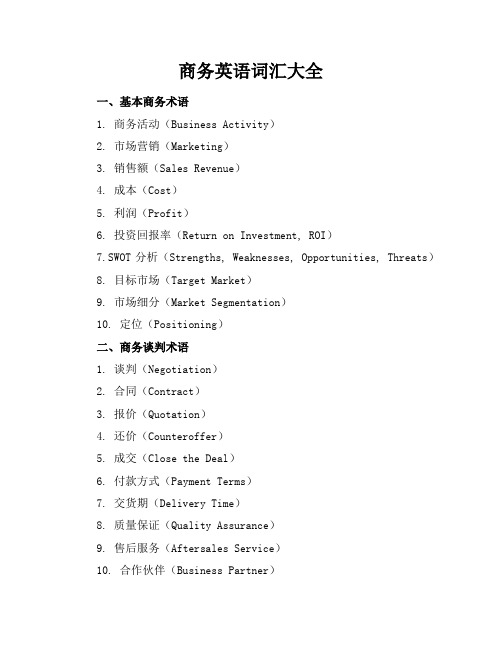
商务英语词汇大全一、基本商务术语1. 商务活动(Business Activity)2. 市场营销(Marketing)3. 销售额(Sales Revenue)4. 成本(Cost)5. 利润(Profit)6. 投资回报率(Return on Investment, ROI)7.SWOT分析(Strengths, Weaknesses, Opportunities, Threats)8. 目标市场(Target Market)9. 市场细分(Market Segmentation)10. 定位(Positioning)二、商务谈判术语1. 谈判(Negotiation)2. 合同(Contract)3. 报价(Quotation)4. 还价(Counteroffer)5. 成交(Close the Deal)6. 付款方式(Payment Terms)7. 交货期(Delivery Time)8. 质量保证(Quality Assurance)9. 售后服务(Aftersales Service)10. 合作伙伴(Business Partner)三、商务函电术语1. 询盘(Inquiry)2. 报盘(Offer)3. 订单(Order)4. 发票(Invoice)5. 装箱单(Packing List)6. 信用证(Letter of Credit, L/C)7. 汇票(Bill of Exchange)8. 托运单(Shipping Order)9. 提单(Bill of Lading)10. 保险(Insurance)四、人力资源术语1. 招聘(Recruitment)2. 简历(Resume)3. 面试(Interview)4. 培训(Training)5. 薪资(Salary)6. 福利(Benefits)7. 绩效考核(Performance Appraisal)8. 晋升(Promotion)9. 劳动合同(Labor Contract)10. 职业规划(Career Planning)五、企业运营术语1. 企业战略(Corporate Strategy)2. 企业文化(Corporate Culture)3. 组织结构(Organizational Structure)4. 部门(Department)5. 团队协作(Teamwork)6. 项目管理(Project Management)7. 生产计划(Production Plan)8. 供应链管理(Supply Chain Management)9. 库存(Inventory)10. 客户关系管理(Customer Relationship Management, CRM)六、财务与会计术语1. 财务报表(Financial Statements)2. 资产(Assets)3. 负债(Liabilities)4. 所有者权益(Owner's Equity)5. 现金流(Cash Flow)7. 资产负债表(Balance Sheet)8. 利润分配(Profit Distribution)9. 折旧(Depreciation)10. 纳税(Taxation)七、国际贸易术语1. 进口(Import)2. 出口(Export)3. 贸易壁垒(Trade Barrier)4. 关税(Tariff)5. 配额(Quota)6. 原产地证明(Certificate of Origin)7. 贸易术语(Trade Terms,如FOB、CIF等)8. 国际支付(International Payment)9. 外汇(Foreign Exchange)10. 世界贸易组织(World Trade Organization, WTO)八、市场营销策略术语1. 市场调研(Market Research)2. 产品生命周期(Product Life Cycle)3. 广告(Advertising)4. 促销(Promotion)5. 公关(Public Relations)6. 品牌战略(Brand Strategy)7. 网络营销(Internet Marketing)8. 社交媒体营销(Social Media Marketing)9. 客户满意度(Customer Satisfaction)10. 忠诚度计划(Loyalty Program)九、企业管理术语1. 领导力(Leadership)2. 决策(Decision Making)3. 风险管理(Risk Management)4. 企业伦理(Business Ethics)5. 知识管理(Knowledge Management)6. 创新能力(Innovation Capability)7. 企业形象(Corporate Image)8. 危机管理(Crisis Management)9. 持续改进(Continuous Improvement)10. 企业社会责任(Corporate Social Responsibility, CSR)十、电子商务术语2. 在线支付(Online Payment)3. 网络安全(Network Security)4. 顾客评价(Customer Review)6. 网络营销策略(Online Marketing Strategy)7. 搜索引擎优化(Search Engine Optimization, SEO)8. 率(Clickthrough Rate, CTR)9. 转化率(Conversion Rate)通过这些词汇的积累,您将能够在商务交流中更加得心应手,展现出您的专业素养和沟通能力。
商务英语考试内容(一)

商务英语考试内容(一)商务英语考试内容考试概述•商务英语考试是为了评估个人在商务场景下使用英语的能力而设立的英语考试,常用于求职或职场晋升的评估标准。
•考试内容涵盖商务沟通、商务写作、商务口语等方面,全面测试考生的商务英语能力。
考试科目•商务英语考试主要包括听力、阅读、口语和写作四个科目。
•各科目的考试内容及形式如下:1.听力:考生需听取商务对话或演讲,并回答相关问题。
2.阅读:考生需阅读商务相关的文章或报告,并回答问题或完成任务。
3.口语:考生需进行商务英语口语对话或演讲,展示自己的口语交际能力。
4.写作:考生需根据所给商务场景或需求,完成商务英语写作任务。
考试重点商务英语考试的重点内容主要包括以下几个方面:•商务礼仪:考察考生在商务交际中的得体举止、商务礼仪规范等。
•商务沟通:考察考生与他人进行商务沟通的能力,包括与同事、客户的交流等。
•商务写作:考察考生的商务英语写作能力,如商务函电、报告、简历等。
•商务词汇与短语:考察商务英语的词汇量和常用短语的掌握程度。
•商务听力:考察考生听取商务对话或演讲的理解能力,并能准确回答问题。
•商务阅读:考察考生阅读商务相关文章或报告的能力,并能理解其中的信息。
考试备考建议•英语学习:提前做好英语基础知识的学习,包括语法、词汇和常用短语等。
•商务知识积累:了解商务相关的知识,如商务礼仪、商务表达方式等。
•模拟练习:进行模拟考试,熟悉考试形式和内容,并逐渐提高答题速度和准确率。
•听力训练:多听商务英语对话或演讲,提高听力理解和应答能力。
•阅读技巧:掌握快速阅读的技巧,提取关键信息,快速回答问题。
•口语练习:与他人进行口语练习,模拟商务场景下的口语交流,增强口语表达能力。
•写作训练:多做商务英语写作练习,提高商务写作能力。
以上是商务英语考试内容及备考建议的一些概述,希望对考生们有所帮助。
祝大家考试顺利!。
剑桥商务英语中级写作范文
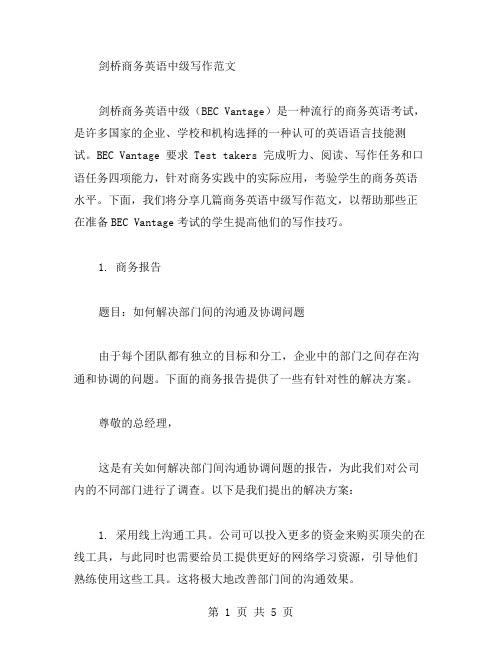
剑桥商务英语中级写作范文剑桥商务英语中级(BEC Vantage)是一种流行的商务英语考试,是许多国家的企业、学校和机构选择的一种认可的英语语言技能测试。
BEC Vantage 要求 Test takers 完成听力、阅读、写作任务和口语任务四项能力,针对商务实践中的实际应用,考验学生的商务英语水平。
下面,我们将分享几篇商务英语中级写作范文,以帮助那些正在准备BEC Vantage考试的学生提高他们的写作技巧。
1. 商务报告题目:如何解决部门间的沟通及协调问题由于每个团队都有独立的目标和分工,企业中的部门之间存在沟通和协调的问题。
下面的商务报告提供了一些有针对性的解决方案。
尊敬的总经理,这是有关如何解决部门间沟通协调问题的报告,为此我们对公司内的不同部门进行了调查。
以下是我们提出的解决方案:1. 采用线上沟通工具。
公司可以投入更多的资金来购买顶尖的在线工具,与此同时也需要给员工提供更好的网络学习资源,引导他们熟练使用这些工具。
这将极大地改善部门间的沟通效果。
2. 加强部门间的协调。
建议企业设立一个协调员,次要任务是在所有部门之间协调与促进沟通。
这位协调员将负责收集所有部门之间的信息,并与相关部门进行沟通,从而更好地协调业务。
3. 资源共享。
每个部门通常都有自己的资源,需要考虑是否可以共享这些资源,以节约成本和提高效率。
每个部门的领导人必须确定资源共享的准则,以确保共享的资源不与部门的其他职责冲突。
通过采用这些方法和策略,我们可以解决企业中部门间的沟通和协调问题,提高公司的商业运营效率,减轻压力并改善员工效率。
2. 商务信函题目:感谢信在商业领域,感谢信是非常常见的一种信函,通常用于表达谢意,或者展示感恩之心。
下面是一封感谢客户的信,可以作为商务信函范文学习。
尊敬的XXX:感谢您对我们商业改进的帮助和支持。
正是由于您的信任和支持,我们的公司在过去的几年里得以茁壮成长,获得了良好的市场份额,并将业务延伸到了全球多个国家和地区。
商务英语的专业知识

商务英语的专业知识
商务英语是指在商务领域使用英语进行沟通和交流的专业知识。
在全球化的时代,商务英语已成为商业和职业成功的关键要素之一。
以下是商务英语的主要专业知识:
1. 商务沟通:商务英语强调有效的沟通能力。
这包括书面和口头沟通能力,以及礼仪和文化差异的理解。
商务信函、报告、演示文稿和会议谈判是商务沟通的关键领域。
2. 跨文化交际:商务英语的另一个重要方面是掌握不同文化之间的交际技巧。
不同国家和地区的商业习俗、礼仪和价值观有很大的差异,了解并尊重这些差异对于在跨国公司或国际贸易中的成功至关重要。
3. 商务语言技能:商务英语的核心是掌握商务语言技能,包括商务词汇、常见商务短语和惯用语。
掌握商务英语的基本语法和语法规则,能够流利地进行商业会谈、演示和协商,对构建业务关系至关重要。
4. 商务策划与管理:商务英语专业知识还包括商务策划和管理技能。
这包括市场调研、商务分析、项目管理和谈判技巧等。
商务英语专业人士需要能够制定并实施商业计划,以及与供应商、客户和合作伙伴进行有效的商务合作。
5. 国际贸易知识:商务英语专业还需要掌握国际贸易的基本知识。
这包括了解国际贸易政策、法规和程序,了解国际贸易中的货币和支付方式,以及了解国际市场的经济和商业环境。
以上是商务英语的主要专业知识。
学习和掌握这些知识可以帮助人们在商业和职业领域取得成功,增强与国际商业伙伴的沟通能力,并在全球商业环境中取得竞争优势。
无论是从事跨国公司职业还是国际贸易,商务英语专业知识都是非常重要的。
自考商务英语写作名词解释题
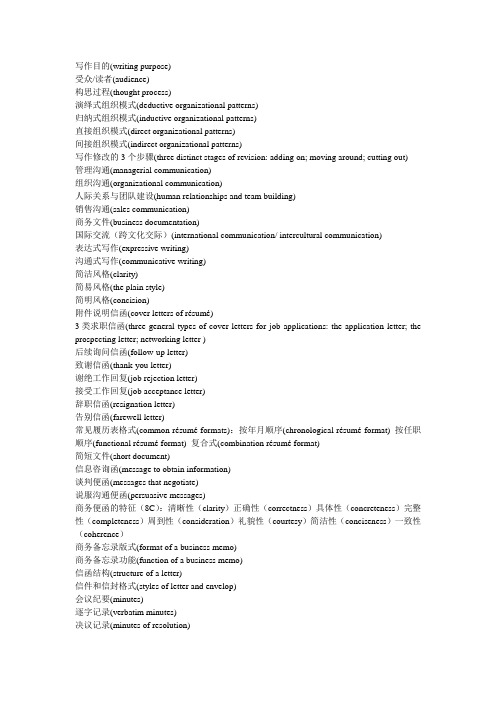
写作目的(writing purpose)受众/读者(audience)构思过程(thought process)演绎式组织模式(deductive organizational patterns)归纳式组织模式(inductive organizational patterns)直接组织模式(direct organizational patterns)间接组织模式(indirect organizational patterns)写作修改的3个步骤(three distinct stages of revision: adding on; moving around; cutting out)管理沟通(managerial communication)组织沟通(organizational communication)人际关系与团队建设(human relationships and team building)销售沟通(sales communication)商务文件(business documentation)国际交流(跨文化交际)(international communication/ intercultural communication)表达式写作(expressive writing)沟通式写作(communicative writing)简洁风格(clarity)简易风格(the plain style)简明风格(concision)附件说明信函(cover letters of résumé)3类求职信函(three general types of cover letters for job applications: the application letter; the prospecting letter; networking letter )后续询问信函(follow-up letter)致谢信函(thank-you letter)谢绝工作回复(job rejection letter)接受工作回复(job acceptance letter)辞职信函(resignation letter)告别信函(farewell letter)常见履历表格式(common résumé formats):按年月顺序(chronological résumé format) 按任职顺序(functional résumé format) 复合式(combination résumé format)简短文件(short document)信息咨询函(message to obtain information)谈判便函(messages that negotiate)说服沟通便函(persuasive messages)商务便函的特征(8C):清晰性(clarity)正确性(correctness)具体性(concreteness)完整性(completeness)周到性(consideration)礼貌性(courtesy)简洁性(conciseness)一致性(coherence)商务备忘录版式(format of a business memo)商务备忘录功能(function of a business memo)信函结构(structure of a letter)信件和信封格式(styles of letter and envelop)会议纪要(minutes)逐字记录(verbatim minutes)决议记录(minutes of resolution)陈述记录(minutes of narration)记录内容版式(minutes’ content format)会议议程(meeting agenda)会议筹划(meeting preparations)会议程序(3个环节)(meeting process: planning & preparing, conducting, and following-up) 会议后续工作(follow-up activities)后续文案职责(accountability of follow-ups)书面发言写作策略(writing strategies for business presentation)书面发言的材料组织(wring organization for business presentation)书面发言用语(language used in a presentation)书面发言避讳用语(language avoided in a presentation)人际沟通的功能(functions of interpersonal communication)人际沟通的目的(purpose of interpersonal communication)人际沟通的4个阶段(four general stages in interpersonal communication)团队的特征(group characteristics)团队的角色(group roles)团队影响力(group influence)沟通结构(communication structures)企业前景(vision)企业使命(mission)企业价值观(corporate values)企业目标(goal)战略计划(strategies)政策与流程(policies and procedures)业务流程的构成要素(15个)(content of procedures)业务流程的版式及内容(format of a procedure)商务文件的层次结构(3个)(tiers of documentation)ISO 9000质量体系(ISO 9000 Quality System )商务蓝皮书(blueprint)商务计划书(business plan)战略性计划书(strategic plan)战术性计划书(tactical plan)操作性计划书(operational plan)操作性管理(operational control)战术性管理(tactical control)战略性管理(strategic control)商务背景(business background)市场计划(marketing plan)财务预测(financial projections)行动计划(action plans)商务提案(business proposal)内部提案(internal proposal)外部提案(external proposal)招标提案(solicited proposal)非招标提案(unsolicited proposal)提案写作的简单模式(simple form for proposal writing)提案写作的复杂模式(detailed form for proposal writing)外部提案的结构要素(6个)(elements of the external proposal: introduction; problem identified and defined; objective & goal set; solutions proposed; implementation & measuring; costs and timeframe estimated)内部提案模式的内容版式(content format of internal proposal)征集提案(Request for Proposal, RFP)征集启示的基本要素(basic components of a RFP)提案评估(proposal evaluation)议程报告(agenda)行程安排(itinerary)费用支出报告(expense reports)项目进程报告(progress report)人事评估报告(personnel evaluation)第一手资料来源(primary sources)第二手资料来源(secondary sources)引证信息(documenting information)解析数据(interpreting data)常规商务报告(routine reports)任务报告(task reports)条目清单功能(itemized lists)图表辅助功能(graphic aids)标题的功能(headings)协议的本质(essence of a deal)合同的修订(contractual modifications)违约与补偿(breach of contract and remedy)律师费用条款(attorneys fees clause)合同免责(escape from contract)第三方签字(third party signature)合同追加条款(contract rider)合同授权(authorization)商务谈判(contract negotiation)合同起草(contract drafting)合同实施(execution)合同终止(closeout)合同(contract)合同有效性(validity of contracts)要约(offer) 接受(acceptance)法定权力(capacity)Sales contracts 买卖合同Contracts for supply of power ,water,gas or heat 供应电、水、气、热力合同Contracts for loan of money 借款合同Leasing contracts 租赁合同Financial leasing contracts 承揽合同Contracts for construction projects建设工程合同Carriage contracts运输合同Technology contracts 技术合同Safekeeping contracts 保管合同Warehousing contracts 仓库合同Agency appointment contracts 委托合同Trading-trust contracts行纪合同Brokerage contracts居间合同。
提高商务英语沟通能力的常见词汇和短语
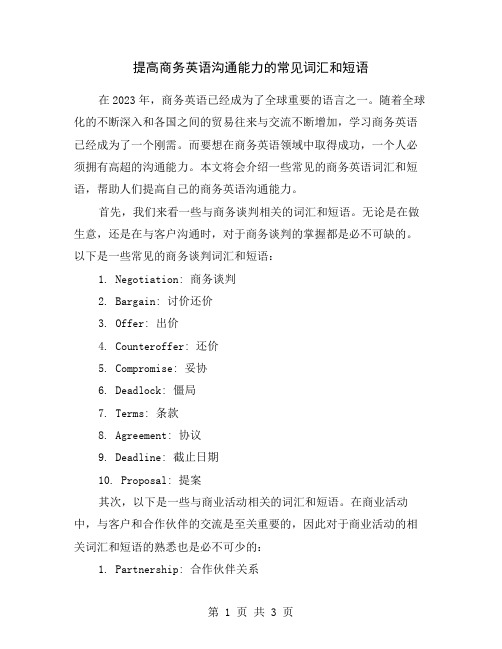
提高商务英语沟通能力的常见词汇和短语在2023年,商务英语已经成为了全球重要的语言之一。
随着全球化的不断深入和各国之间的贸易往来与交流不断增加,学习商务英语已经成为了一个刚需。
而要想在商务英语领域中取得成功,一个人必须拥有高超的沟通能力。
本文将会介绍一些常见的商务英语词汇和短语,帮助人们提高自己的商务英语沟通能力。
首先,我们来看一些与商务谈判相关的词汇和短语。
无论是在做生意,还是在与客户沟通时,对于商务谈判的掌握都是必不可缺的。
以下是一些常见的商务谈判词汇和短语:1. Negotiation: 商务谈判2. Bargain: 讨价还价3. Offer: 出价4. Counteroffer: 还价5. Compromise: 妥协6. Deadlock: 僵局7. Terms: 条款8. Agreement: 协议9. Deadline: 截止日期10. Proposal: 提案其次,以下是一些与商业活动相关的词汇和短语。
在商业活动中,与客户和合作伙伴的交流是至关重要的,因此对于商业活动的相关词汇和短语的熟悉也是必不可少的:1. Partnership: 合作伙伴关系2. Client: 客户3. Customer base: 客户群4. Market research: 市场调研5. Product launch: 产品发布6. Sales pitch: 销售演讲7. Branding: 品牌塑造8. Promotion: 推广9. Advertising: 广告宣传10. Revenue: 收入最后,以下是一些常见的商务邮件词汇和短语。
随着信息化的快速发展,商务邮件已经成为了商务沟通中不可或缺的一部分。
以下是一些常见的商务邮件词汇和短语:1. Greeting: 问候2. Inquiry: 询问3. Request: 请求4. Confirmation: 确认5. Proposal: 提议6. Follow-up: 跟进7. Deadline: 截止日期8. Attachment: 附件9. Apology: 道歉10. Closing: 结束通过掌握以上词汇和短语,可以帮助人们在商务沟通中更加自如地表达自己。
商务英语沟通实用手册

商务英语沟通实用手册1. 引言1.1 概述商务英语沟通是在商业环境中使用英语进行交流的技巧和策略。
随着全球化的发展,越来越多的企业需要与国际客户和合作伙伴进行沟通,因此掌握商务英语沟通技巧对于职场成功至关重要。
1.2 商务英语沟通的重要性商务英语沟通在现代商业社会中具有重要地位。
良好的商务英语能力不仅有助于建立信任和互相理解,还可以提高工作效率、促进合作、增加销售机会等。
同时,通过有效地运用商务英语进行沟通,我们能够传达出专业、自信和可靠的形象,从而赢得他人的尊重和认可。
1.3 目的和范围本文档旨在为读者提供一份全面而实用的商务英语沟通手册,帮助读者掌握必要的知识和技巧。
该手册将涵盖商务英语基础知识、跨文化交流与商务礼仪、电子邮件和商务函电写作技巧以及会议与谈判技巧等方面内容。
通过学习本手册,读者将能够提高他们的商务英语沟通能力,更加自信和成功地应对职场挑战。
2. 商务英语基础知识:商务英语是在商务环境中进行沟通和交流的一种特殊形式的英语。
它具有一些独特的词汇和表达方式,同时也需要具备良好的书面和口头沟通技巧。
在这一部分,我们将介绍商务英语基础知识的重要内容。
2.1 常用商务英语词汇:了解和掌握常用的商务英语词汇对于有效地沟通至关重要。
以下是一些常用的商务英语词汇分类:- 公司组织结构:例如CEO(首席执行官)、CFO(首席财务官)、HR(人力资源)等。
- 会议和谈判:例如agenda(议程)、minutes(会议纪要)、negotiation(谈判)等。
- 销售与市场营销:例如target market(目标市场)、promotion(促销)等。
- 财务与投资:例如profit margin(利润率)、return on investment(投资回报率)等。
- 职业发展:例如networking(建立人际关系网)、work-life balance(工作生活平衡)等。
通过积累和运用这些常用词汇,你可以更加准确地表达自己并理解他人在商务场景中的意图和需求。
剑桥商务英语口试必备手册====每天必读
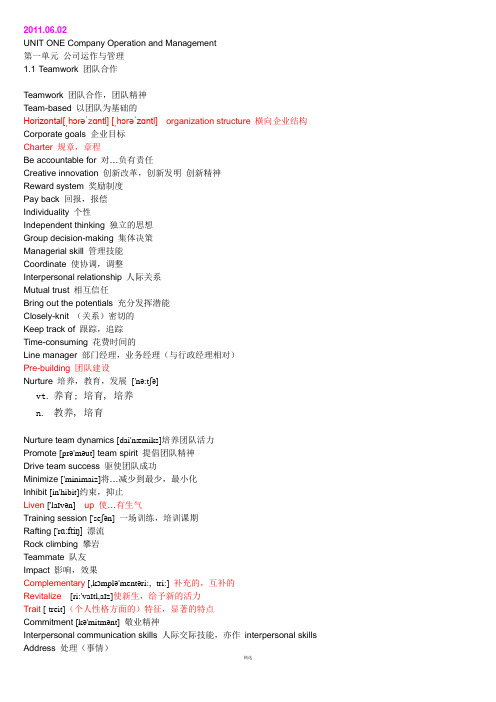
2011.06.02UNIT ONE Company Operation and Management第一单元公司运作与管理1.1 Teamwork 团队合作Teamwork 团队合作,团队精神Team-based 以团队为基础的Horizontal[ˌhɔrəˈzɑntl] [ˌhɔrəˈzɑntl] organization structure 横向企业结构Corporate goals 企业目标Charter 规章,章程Be accountable for 对…负有责任Creative innovation 创新改革,创新发明创新精神Reward system 奖励制度Pay back 回报,报偿Individuality 个性Independent thinking 独立的思想Group decision-making 集体决策Managerial skill 管理技能Coordinate 使协调,调整Interpersonal relationship 人际关系Mutual trust 相互信任Bring out the potentials 充分发挥潜能Closely-knit (关系)密切的Keep track of 跟踪,追踪Time-consuming 花费时间的Line manager 部门经理,业务经理(与行政经理相对)Pre-building 团队建设Nurture 培养,教育,发展['nə:tʃə]vt. 养育; 培育, 培养n. 教养, 培育Nurture team dynamics [dai'næmiks]培养团队活力Promote [prə'məut] team spirit 提倡团队精神Drive team success 驱使团队成功Minimize ['minimaiz]将…减少到最少,最小化Inhibit [in'hibit]约束,抑止Liven ['laɪvən]up 使…有生气Training session ['seʃən]一场训练,培训课期Rafting ['rɑ:ftiŋ]漂流Rock climbing 攀岩Teammate 队友Impact 影响,效果Complementary [,kɔmplə'mentəri:, -tri:]补充的,互补的Revitalize [ri:'vaɪtl,aɪz]使新生,给予新的活力Trait [treit](个人性格方面的)特征,显著的特点Commitment [kə'mitmənt]敬业精神Interpersonal communication skills 人际交际技能,亦作interpersonal skillsHow to Make Teams Effective如何组建精锐的团队People in every workplace talk about building the team, working as a team, and my team, but few understand how to create the experience of teamwork or how to develop an effective team.在各种工作场合,人们都在谈论团队建设、团队合作、自己的团队,但是却很少有人真正理解如何体验团队合作以及如何组建一支精锐的团队。
商务英语在管理中的作用

商务英语在管理中的作用
商务英语在管理中发挥着重要作用,主要体现在以下几个方面:
1. 跨国交流:在全球化的背景下,商务英语成为了不同国家和文化之间沟通的桥梁。
商务英语的应用能够帮助管理者进行国际商务谈判、沟通和协商,促进跨国交流和合作。
2. 信息获取和分析:通过商务英语,管理者能够获取并分析各种商业信息,如市场调研数据、竞争对手分析、财务报告等。
这些信息对于管理者制定战略和决策具有重要的参考价值。
3. 多语言团队管理:在跨国企业中,管理者常常需要管理来自不同语言背景的团队成员。
掌握商务英语可以帮助管理者有效地进行团队沟通和协调工作,提高团队的合作效率和凝聚力。
4. 跨文化沟通:在跨国企业中,不同国家和地区有不同的文化背景和习俗。
商务英语的应用可以帮助管理者更好地理解和尊重他们所处的文化环境,避免不必要的沟通障碍和误解。
5. 商务会议和演讲:商务英语的应用能够帮助管理者更加自信地进行商务会议和演讲,提高沟通效果和影响力。
良好的商务英语能力还能帮助管理者在业界和职业圈中树立良好的形象和口碑。
综上所述,商务英语在管理中的作用是多方面的,能够帮助管理者跨越语言和文化障碍,提高跨国交流和团队管理能力,获
取和分析商业信息,提高沟通效果和影响力,为企业的发展和成功做出贡献。
商务英语沟通 topic 1

威胁,害怕,个人想法,以自我为中心,偏见 等)
(4) Semantic Noise(语义上的干扰) It is caused by using different languages; the •use of jargon;different understanding of the message delivered; etc.
Please match each kind of noise in Column A with one of the examples concerning noise in Column B.
Column A 1. external noise
2. physiological noise 3. psychological noise 4. semantic noise
• Decoding 解码 • Even if a message does get to its intended receiver intact, there is no guarantee that it will be understood as the sender intended it to be . The receiver must decode it, attaching meaning to the words or symbols. As we have already seen, decoding is not always accurate.
Discussቤተ መጻሕፍቲ ባይዱon 1
The Social Context(社会/人文关系语境)
• The social context refers to the relationship between the communicators, as well as who is present. Imagine, for instance, the difference in asking a manager for a raise under a variety of different social contexts
商务英语沟通
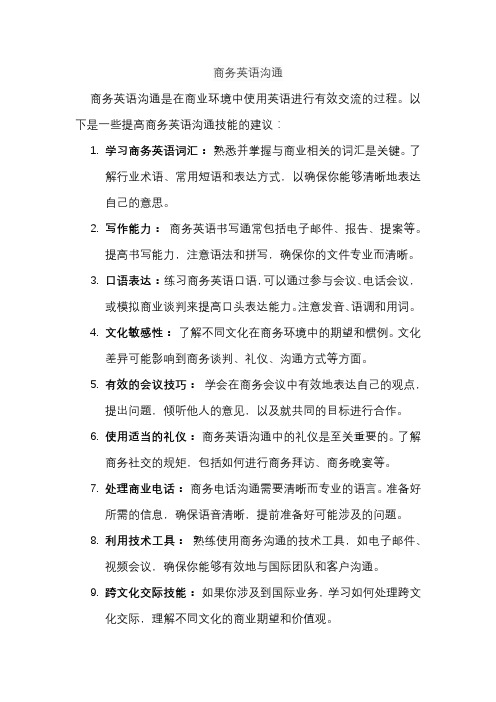
商务英语沟通
商务英语沟通是在商业环境中使用英语进行有效交流的过程。
以下是一些提高商务英语沟通技能的建议:
1.学习商务英语词汇:熟悉并掌握与商业相关的词汇是关键。
了
解行业术语、常用短语和表达方式,以确保你能够清晰地表达
自己的意思。
2.写作能力:商务英语书写通常包括电子邮件、报告、提案等。
提高书写能力,注意语法和拼写,确保你的文件专业而清晰。
3.口语表达:练习商务英语口语,可以通过参与会议、电话会议,
或模拟商业谈判来提高口头表达能力。
注意发音、语调和用词。
4.文化敏感性:了解不同文化在商务环境中的期望和惯例。
文化
差异可能影响到商务谈判、礼仪、沟通方式等方面。
5.有效的会议技巧:学会在商务会议中有效地表达自己的观点,
提出问题,倾听他人的意见,以及就共同的目标进行合作。
6.使用适当的礼仪:商务英语沟通中的礼仪是至关重要的。
了解
商务社交的规矩,包括如何进行商务拜访、商务晚宴等。
7.处理商业电话:商务电话沟通需要清晰而专业的语言。
准备好
所需的信息,确保语音清晰,提前准备好可能涉及的问题。
8.利用技术工具:熟练使用商务沟通的技术工具,如电子邮件、
视频会议,确保你能够有效地与国际团队和客户沟通。
9.跨文化交际技能:如果你涉及到国际业务,学习如何处理跨文
化交际,理解不同文化的商业期望和价值观。
10.不断学习和改进:商务环境和语言是不断演变的,保持学习的
态度,随时更新自己的知识和技能。
通过这些建议,你可以提高在商务环境中使用英语进行有效沟通的能力,促进更加顺畅的商业交流。
商务英语沟通 communication in the workplace

Microclimate
• Organizations create an overall climate, which can be healthy or polluted, but within that environment individual relationships have their own microclimates. For example, your interactions with one colleague might be described as icy, while you and another person enjoy a warm relationship. •
Communication by leaders and managers.
• Leaders and managers with the capacity to communicate effectively are able to work directly with people. Consequently, there are fewer hidden agenda and issues are resolved at an early stage before they become long-term problems. Effective communication by leaders and managers leads to fewer direct controls and more understanding, commitment and motivation.
• In turn, satisfied employees are likely to have high morale---the overall attitude that employees have toward the workplace. Morale reflects the degree to which they perceive that their needs are being met by their jobs. It is determined by a variety of factors, including job satisfaction and satisfaction with such things as pay, benefits, coworkers, and promotion opportunities.
商务英语沟通技巧

商务英语沟通技巧
商务英语沟通技巧包括但不限于以下方面:
1. 充分准备:在与商务伙伴进行英语沟通之前,充分准备是非常重要的。
这包括了解对方的文化、背景和语言习惯,以便更好地理解和沟通。
2. 建立良好的关系:在商务英语沟通中,建立良好的关系非常重要。
要尽可能地与对方建立信任和友好关系,这有助于促进有效的沟通。
3. 清晰明了的表达:使用简单明了的语言进行沟通是商务英语的关键。
避免使用过于复杂或难以理解的词汇和句子结构。
4. 倾听和理解:在商务英语沟通中,倾听和理解对方是非常重要的。
要尽可能地理解对方的观点和需求,并尽可能地回应他们的需求。
5. 确认和澄清:在商务英语沟通中,确认和澄清是非常重要的。
要确保自己完全理解对方的意思,可以通过问问题或重述来确认。
6. 保持专业和礼貌:在商务英语沟通中,保持专业和礼貌是非常重要的。
要使用礼貌的语言,避免过于直接或粗鲁的表达方式。
7. 适应和尊重文化差异:商务英语沟通通常涉及不同文化之间的交流,因此适应和尊重文化差异是非常重要的。
要尽可能了解对方的文化和价值观,并尝试在沟通中体现出来。
8. 学习和实践:不断学习和实践是提高商务英语沟通技巧的关键。
可以通过阅读、参加培训、与不同的人交流等方式来提高自己的商务英语沟通技巧。
希望以上技巧能对你有所帮助。
商务英语沟通话术
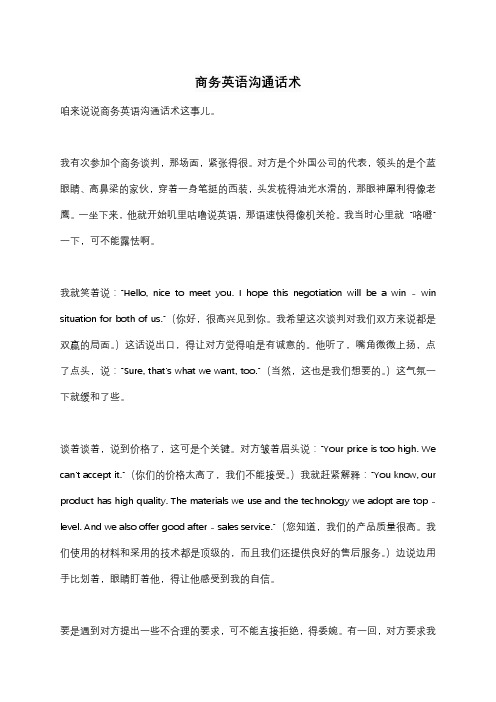
商务英语沟通话术咱来说说商务英语沟通话术这事儿。
我有次参加个商务谈判,那场面,紧张得很。
对方是个外国公司的代表,领头的是个蓝眼睛、高鼻梁的家伙,穿着一身笔挺的西装,头发梳得油光水滑的,那眼神犀利得像老鹰。
一坐下来,他就开始叽里咕噜说英语,那语速快得像机关枪。
我当时心里就“咯噔” 一下,可不能露怯啊。
我就笑着说:“Hello, nice to meet you. I hope this negotiation will be a win - win situation for both of us.”(你好,很高兴见到你。
我希望这次谈判对我们双方来说都是双赢的局面。
)这话说出口,得让对方觉得咱是有诚意的。
他听了,嘴角微微上扬,点了点头,说:“Sure, that's what we want, too.”(当然,这也是我们想要的。
)这气氛一下就缓和了些。
谈着谈着,说到价格了,这可是个关键。
对方皱着眉头说:“Your price is too high. We can't accept it.”(你们的价格太高了,我们不能接受。
)我就赶紧解释:“You know, our product has high quality. The materials we use and the technology we adopt are top - level. And we also offer good after - sales service.”(您知道,我们的产品质量很高。
我们使用的材料和采用的技术都是顶级的,而且我们还提供良好的售后服务。
)边说边用手比划着,眼睛盯着他,得让他感受到我的自信。
要是遇到对方提出一些不合理的要求,可不能直接拒绝,得委婉。
有一回,对方要求我们缩短交货期,这根本做不到啊。
我就说:“I understand your req uest, but it's really a big challenge for us. You see, our production process is very complicated and strict. If we shorten the delivery time, it may affect the quality of the products. Maybe we can discuss other solutions.”(我理解您的要求,但这对我们来说真的是个很大的挑战。
商务英语专业介绍
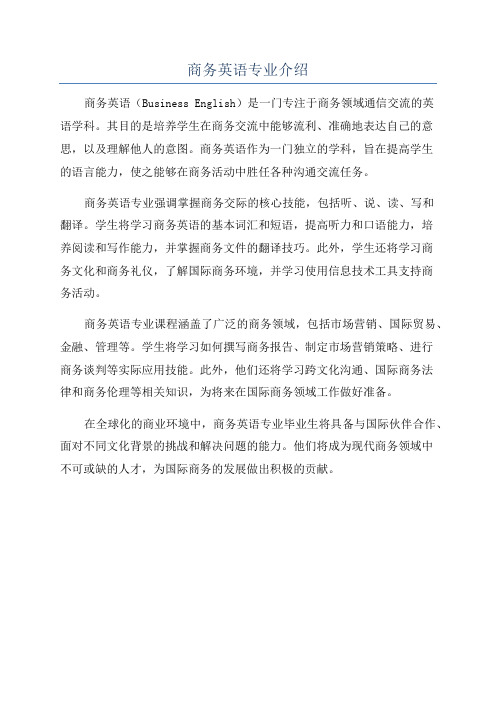
商务英语专业介绍
商务英语(Business English)是一门专注于商务领域通信交流的英
语学科。
其目的是培养学生在商务交流中能够流利、准确地表达自己的意思,以及理解他人的意图。
商务英语作为一门独立的学科,旨在提高学生
的语言能力,使之能够在商务活动中胜任各种沟通交流任务。
商务英语专业强调掌握商务交际的核心技能,包括听、说、读、写和
翻译。
学生将学习商务英语的基本词汇和短语,提高听力和口语能力,培
养阅读和写作能力,并掌握商务文件的翻译技巧。
此外,学生还将学习商
务文化和商务礼仪,了解国际商务环境,并学习使用信息技术工具支持商
务活动。
商务英语专业课程涵盖了广泛的商务领域,包括市场营销、国际贸易、金融、管理等。
学生将学习如何撰写商务报告、制定市场营销策略、进行
商务谈判等实际应用技能。
此外,他们还将学习跨文化沟通、国际商务法
律和商务伦理等相关知识,为将来在国际商务领域工作做好准备。
在全球化的商业环境中,商务英语专业毕业生将具备与国际伙伴合作、面对不同文化背景的挑战和解决问题的能力。
他们将成为现代商务领域中
不可或缺的人才,为国际商务的发展做出积极的贡献。
《商务英语沟通》读后感
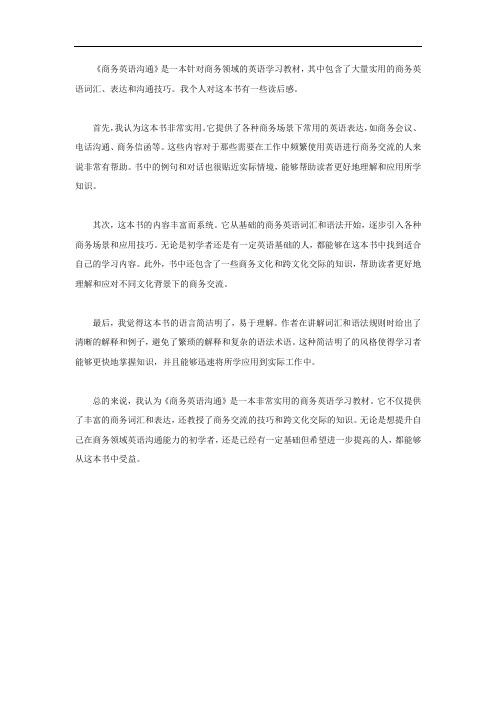
《商务英语沟通》是一本针对商务领域的英语学习教材,其中包含了大量实用的商务英语词汇、表达和沟通技巧。
我个人对这本书有一些读后感。
首先,我认为这本书非常实用。
它提供了各种商务场景下常用的英语表达,如商务会议、电话沟通、商务信函等。
这些内容对于那些需要在工作中频繁使用英语进行商务交流的人来说非常有帮助。
书中的例句和对话也很贴近实际情境,能够帮助读者更好地理解和应用所学知识。
其次,这本书的内容丰富而系统。
它从基础的商务英语词汇和语法开始,逐步引入各种商务场景和应用技巧。
无论是初学者还是有一定英语基础的人,都能够在这本书中找到适合自己的学习内容。
此外,书中还包含了一些商务文化和跨文化交际的知识,帮助读者更好地理解和应对不同文化背景下的商务交流。
最后,我觉得这本书的语言简洁明了,易于理解。
作者在讲解词汇和语法规则时给出了清晰的解释和例子,避免了繁琐的解释和复杂的语法术语。
这种简洁明了的风格使得学习者能够更快地掌握知识,并且能够迅速将所学应用到实际工作中。
总的来说,我认为《商务英语沟通》是一本非常实用的商务英语学习教材。
它不仅提供了丰富的商务词汇和表达,还教授了商务交流的技巧和跨文化交际的知识。
无论是想提升自己在商务领域英语沟通能力的初学者,还是已经有一定基础但希望进一步提高的人,都能够从这本书中受益。
- 1、下载文档前请自行甄别文档内容的完整性,平台不提供额外的编辑、内容补充、找答案等附加服务。
- 2、"仅部分预览"的文档,不可在线预览部分如存在完整性等问题,可反馈申请退款(可完整预览的文档不适用该条件!)。
- 3、如文档侵犯您的权益,请联系客服反馈,我们会尽快为您处理(人工客服工作时间:9:00-18:30)。
Activities
Role-plays: experiential learning, not just games Aftermath experience sharing would be important
Scoring: class performance 50% and course report 50%
5
公司沟通(沟通用于企业)
有效沟通策略 企业沟通职能与设置 与雇员沟通 与公众沟通
2005-11-17
清华大学经管学院EMBA2004
Business,Managerial,Corporate Communication and Public Relations
Business Communication (Personal Skills)
Managerial Communication (involve management activities)
Communication strategy Effective listening Effective persuasion Meeting management Cross cultural communication Communicating in groups
2005-11-17 清华大学经管学院EMBA2004 18
领导者、沟通与组织
一个组织的领导必然是组织的首席沟通官,必须负责整个组织的沟通工 作……。
罗伯特•麦与阿兰• 阿克松,The Leader as Communicator, Amacom, 2003
我的同事做过一项调查,对几位具有世界影响力的伟人进行研究之后发 现,所有这些伟大的人物在和人们沟通的时候,都使用了三个部分的沟 通手段:第一是强调愿景,其次强调用怎样的战略把这个愿景变成事 实;第三,他们强调人,尊重同处一室的人,一个组织里或一个国家的 人。
15
Starting from Some Corporations
Li & Fung Limited Southeast Airlines Case study:好战略执行起来为什么这 样难
2005-11-17
清华大学经管学院EMBA2004
16
案例讨论
案例:好战略,执行起来为什么这样难
讨论时间:30分钟 讨论题:
这里有没有问题?出了什么问题? 如果你是张剑锋,你认为为什么出现这样的问题? 如果你是刘亚洲,你该怎么办? 有什么经验教训我们可以吸取的?如果你是刘亚洲(或者 张剑锋),如果一切都可以重来,你的做法会不会有什么 不同?
2005-11-17
清华大学经管学院EMBA2004
17
Case Study
Case: Good strategy, why so hard to implement
Corporate Communication (Corporate setting)
Communication strategy Corporate communication functions Public communication 2005-11-17
清华大学经管学院EMBA2004
6
课程内容安排
Public Relations (all organizations)
Public Opinions, Ethics, Legislation and Research Public Relations functions Crisis Management Integrated Marketing Communication Media Relations Employee Relations Government Relations Customer Relations Investor Relations
AM: Effective speaking PM: Effective stimulation and persuasion
Day three
AM: Effective negotiation PM: Crisis communication
Day four
AM: Media communication PM: Corporate communication
2005-11-17 清华大学经管学院EMBA2004 10
领导者、员工、组织与有效沟通原理
第一天
2005-11-17
清华大学经管学院EMBA2004
11
Leaders, Organizations, Employees and Comm11-17
清华大学经管学院EMBA2004
Time: 30 minutes Suggested Questions:
Are there any problems? What problems? If you were Zhang Jianfeng, what do you think cause it/them? If you were Liu Yazhou, what should you do facing this situation? What lessons can we learn from this case? If you were Liu Yazhou or Zhang Jianfeng, what would you have done differently?
12
内容安排
领导者最需要学习管理沟通
领导者、沟通与组织发展
案例:好战略为什么执行起来这样难
不同情境要求不同的领导/沟通风格 心态决定沟通效果
案例:Cherie
管理沟通原理
2005-11-17 清华大学经管学院EMBA2004 13
Agenda
Leaders must be communication experts
商务英语(管理沟通)
清华大学经管学院副教授钱小军 电子邮箱:qianxj@
2005-11-17
清华大学经管学院EMBA2004
1
Business English (Managerial Communication)
Dr. Xiaojun Qian, Associate Professor SEM, Tsinghua University E-mail: qianxj@
2005-11-17
清华大学经管学院EMBA2004
8
课程要求
互动式教学方式:案例、活动、讨论与讲授相结合 案例学习三步骤:
阅读:了解案例背景,独立思考问题产生的原因和解决问题 的方法(希望能做到提前阅读和思考) 小组讨论:小范围内澄清、深入、分享和借鉴 全班讨论:大范围分享、交流和提高
活动
体验式学习,不是游戏 活动后有讨论
2005-11-17
清华大学经管学院EMBA2004
2
引言
商务沟通、管理沟通、公司沟通与公共 关系 本课程内容安排 课程要求
2005-11-17
清华大学经管学院EMBA2004
3
Course Introduction
Introduction of related theories Syllabus Requirements Self-introduction
沃顿商学院管理首席教授、领导艺术和变革管理研究中心主任迈克•尤西姆
2005-11-17
清华大学经管学院EMBA2004
19
Leadership, Communication and Organization
The Leader of an organization is automatically the designated chief communication officer and is accountable for all communication in the organization ….
课堂表现50%,课后报告50%
2005-11-17 清华大学经管学院EMBA2004 9
Course Requirement
Participative teaching: combination of case study, activities, discussions and lectures Case study steps:
Communication strategy Business writing Business presentation Employment (resume writing and Job interviews) Communicating with media Communicating with investors Communicating with employees Communicating with government Crisis communication
Leaders, communication and organization development
Case study: 好战略为什么执行起来这样难
Different situations require different leadership/communication styles Attitude determines
Case study:Cherie Cosmetics
Managerial communication strategy
2005-11-17 清华大学经管学院EMBA2004 14
从一些企业谈起
香港利丰集团 西南航空公司 案例:好战略执行起来为什么这样难
2005-11-17
清华大学经管学院EMBA2004
第一天
领导、组织、员工与有效沟通原理
第二天
上午:有效表达(演讲技能) 下午:有效激励与说服
第三天
